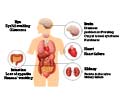Researchers have identified a new protein that is secreted with insulin and travels through the bloodstream.

"We've known for a long time that diabetes hurts the brain, and there has been a lot of speculation about why that occurs, but there has been no conclusive evidence until now," said UC Davis Alzheimer's Disease Center Director Charles DeCarli.
"This research is the first to provide clear evidence that amylin gets into the brain itself and that it forms plaques that are just like the amyloid beta that has been thought to be the cause of Alzheimer's disease," DeCarli said. "In fact, the amylin looks like the amyloid beta protein, and they both interact. That's why we're calling it the second amyloid of Alzheimer's disease."
"Amylin deposition in the brain: A second amyloid in Alzheimer's disease?" is published online in the Annals of Neurology.
Type 2 diabetes is a chronic metabolic disorder that increases the risk for cerebrovascular disease and dementia, a risk that develops years before the onset of clinically apparent diabetes. Its incidence is far greater among people who are obese and insulin resistant.
Amylin, or islet amyloid polypeptide, is a hormone produced by the pancreas that circulates in the bloodstream with insulin and plays a critical role in glycemic regulation by slowing gastric emptying, promoting satiety and preventing post-prandial spikes in blood glucose levels. Its deposition in the pancreas is a hallmark of type 2 diabetes.
Advertisement
The study was conducted by examining brain tissue from individuals who fell into three groups: those who had both diabetes and dementia from cerebrovascular or Alzheimer's disease; those with Alzheimer's disease without diabetes; and age-matched healthy individuals who served as controls.
Advertisement
"We found that the amylin deposits in the brains of people with dementia are both independent of and co-located with the Aβ, which is the suspected cause of Alzheimer's disease," said Florin Despa, assistant professor-in-residence in the UC Davis Department of Pharmacology. "It is both in the walls of the blood vessels of the brain and also in areas remote from the blood vessels."
"It is accumulating in the brain and we found signs that amylin is killing neurons similar to Αβ," he continued. "And that might be the answer to the question of 'What makes obese and type 2 diabetes patients more prone to developing dementia?'"
The researchers undertook the investigation after Despa and his colleagues found that amylin accumulates in the blood vessels and muscle of the heart. From this evidence, he hypothesized that the same thing might be happening in the brain. To test the hypothesis he received a pilot research grant through the Alzheimer's Disease Center.
The research was conducted using tissue from the brains of individuals over 65 donated to the UC Davis Alzheimer's Disease Center: 15 patients with Alzheimer's disease and type 2 diabetes; 14 Alzheimer's disease patients without diabetes; and 13 healthy controls. A series of tests, including Western blot, immunohistochemistry and ELISA (enzyme-linked immunosorbent assay) were used to test amylin accumulation in specimens from the temporal cortex.
In contrast with the healthy brains, the brain tissue infiltrated with amylin showed increased interstitial spaces, cavities within the tissue, sponginess, and blood vessels bent around amylin accumulation sites.
Despa said that the finding may offer a therapeutic target for drug development, either by increasing the rate of amylin elimination through the kidneys, or by decreasing its rate of oligomerization and deposition in diabetic patients.
"If we're smart about the treatment of pre-diabetes, a condition that promotes increased amylin secretion, we might be able to reduce the risk of complications, including Alzheimer's and dementia," Despa said.
Source-Eurekalert










